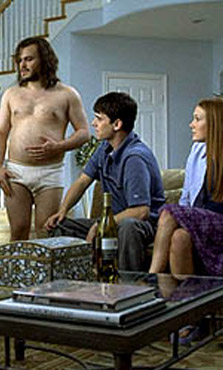|

Jake Kasdan’s debut, “The Zero Effect,” was such a wonderfully subtle and accomplished first feature I found myself looking forward to “Orange County” with great anticipation, not least because of the involvement of the Jack Black. It is with sadness that I report that Kasdan has suffered a dramatic regression on his sophomore effort, although I confess that seeing the film at midnight in a Connecticut multiplex may have served to underscore the inanity of this Californian, all-too-Californian product.
I’m a big fan of the irreverent yet sentimental teenage coming-of-age story, and the prospect of detailing the sufferings and longing for escape of a young boy trapped behind the Orange Curtain has all the makings of a visionary comedy. “Orange County” tacitly acknowledges that its namesake is ripe for skewering, carrying with it a mild inferiority complex suitable for its hero, Shaun, who desperately wants to escape. Early on, as the satire flies thick and heavy— which for Kasdan means little more than a Chevy Chase cameo— Orange County is a cultural wasteland of “Clueless” proportions. Of course, by the end, Shaun rather predictably realizes that he loves Orange County. It’s home, like it or not, and Shaun makes peace with his roots (by learning to accept his “Broseph”, Jack Black, who almost single-handedly rescues the film with a bravura performance even though his character is as un-Orange County as you can get).
No one would take away Shaun’s right to love and offer a tortuous encomium to his family, friends, and polis, but the film is a miserable mediocrity because the story’s early cheap shots seem like gentle kidding while the “epiphanic” conclusion feels like an underfed haiku. Kasdan’s mistake, in other words, is that he fails to make a convincing case for or against Orange County, even though he clearly recognizes there is a case to be made in either direction. As a white-bread cloning factory for soulless consumers, his Orange County is not very soulless. And as a hotbed of brilliant, genuinely searching young minds, it’s not so brilliant. The film is clearly meant to be a meditation on the place, as much as Woody Allen’s “Manhattan” or the Coens’ “Fargo”, but it falls short in virtually every possible category. The leads have no discernible personality, the supporting cast of Orangers are merely Spicoli clones wholly indistinguishable from each other, and the actual area could have been any beach community in Southern California.
Indeed, the bullseye is missed so badly that we are left to conclude one of two things. Either the screenwriter is not actually from Orange County or he lacks not only a talent for psychological analysis but even the basic journalistic ability to tap into the vernacular of a subculture. That “Orange County” is essentially a low-fi indie film with a necessarily limited scope is no excuse when compared to an equally scrappy but infinitely more ambitious movie like “SLC Punk!”, which managed to capture a time, a place, and not one but several different cultures clashing with each other. Actually, a third possibility exists which is attractive but unlikely: in putting such a faceless movie onscreen, might Kasdan have been making an oblique and devastatingly ironic comment on Orange County?
The most glaring miscalculation is Shaun himself. Initially he’s portrayed as a beach-bum slacker with no hope of getting into college, the classic teenage movie prototype: weary, confused, earnest, and a little angry. Then you find out he does want to go to college (for reasons that seem highly arbitrary— what if he’d found Mein Kampf in the sand?). So he’s really not such a slacker after all, especially in contrast to his ape of a brother. Then you find out that he wants to go, not just to any old diploma mill, but to Stanford. Stanford? This was a stretch. I doubt that constitutionally aimless surfer dudes living in Seal Beach really care about getting into college, let alone Stanford, but, still, Kasdan hadn’t lost me yet. That moment came later, an hour or so into the movie, when we find out Shaun is actually a straight A student with a score of 1500 on the SAT. 1500...?
Let’s pause and do some tallying. Shaun, our hero, is a member of a fairly wealthy family (with, like, totally bogus problems— Mom and Dad aren’t speaking and the maid is getting majorly upitty!), goes with a pretty girlfriend, has excellent grades, sky-high test scores, and probably an unlimited number of colleges who would take him, whose main problem is that he can’t get into Stanford because of a silly paperwork snafu. If my math is correct that adds up to an hour and a half of an elitist, rich white kid whining because he can’t attend his country-club dream school. This isn’t exactly Rocky out jogging on a bone-chilling South Philly morning backed by a rousing orchestral score, is it. Somehow Kasdan pulled off the remarkable feat of creating an underdog movie without furnishing his audience with an underdog. All that aside, the film does have the virtue of comparing Shaun’s growth as a young novelist in Orange County to Faulkner’s in Mississippi, which, given Shaun’s apparent talent for writing, offers one of the deftest criticisms of Faulkner ever made. |
|